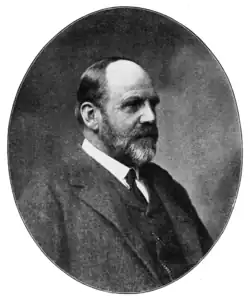Francis Darwin

Sir Francis Darwin FLS FRS FRSE (16 August 1848 – 19 September 1925) was a British botanist. He was the third son of Charles Darwin.
Quotes
- In science the credit goes to the man who convinces the world, not to the man to whom the idea first occurs. Not the man who finds a grain of new and precious quality but to him who sows it, reaps it, grinds it and feeds the world on it.
- "Francis Galton", the first Galton Lecture, delivered before the Eugenics Education Society, 16 February 1914; reprinted, with some changes, from the Eugenics Review of April 1914, in Rustic Sounds and Other Studies in Literature and Natural History (London: John Murray, 1917), p. 24
The Life and Letters of Charles Darwin (1887)
- London: John Murray
- There seems to be one quality of mind which seems to be of special and extreme advantage in leading him to make discoveries. It was the power of never letting exceptions go unnoticed.
- Vol. 1, ch. 3 (p. 148)
- The love of experiment was very strong in him, and I can remember the way he would say, "I shan't be easy till I have tried it," as if an outside force were driving him. He enjoyed experimenting much more than work which only entailed reasoning, and when he was engaged on one of his books which required argument and the marshalling of facts, he felt experimental work to be a rest or holiday.
- Vol. 1, ch. 3 (p. 150)
- For books he had no respect, but merely considered them as tools to be worked with. Thus he did not bind them, and even when a paper book fell to pieces from use, as happened to Müller’s ‘Befruchtung,’ he preserved it from complete dissolution by putting a metal clip over its back. In the same way he would cut a heavy book in half, to make it more convenient to hold. He used to boast that he had made Lyell publish the second edition of one of his books in two volumes, instead of in one, by telling him how ho had been obliged to cut it in half. Pamphlets were often treated even more severely than books, for he would tear out, for the sake of saving room, all the pages except the one that interested him, The consequence of all this was, that his library was not ornamental, but was striking from being so evidently a working collection of books.
- Vol. 1, ch. 3 (p. 150)